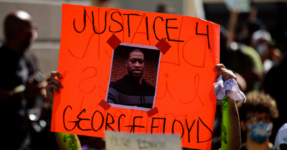Fourth Police Officer Sentenced Over Killing of George Floyd

The fourth Minneapolis police officer prosecuted over the killing of George Floyd has been sentenced in the United States, bringing the criminal proceedings relating to perhaps the most publicised incident of police brutality since the horrific beating of Rodney King to a close.
The charge
The last of the officers to have his case finalised, Tou Thao, was charged with the federal offence of aiding and abetting second-degree manslaughter for holding back a crowd of bystanders as officer Derek Chauvin pressed his knee into the neck and back of George Floyd, who was handcuffed and lying on his stomach, for more than nine minutes causing his death.
All four former Minneapolis officers involved in the killing: Tou Thao, Derek Chauvin, Thomas Lane, and J. Alexander Kueng were immediately dismissed from the state’s police force and subsequently, after the incident sparked outrage, riots and protests against police brutality in the streets of America and around the globe.
‘Held back anyone who tried to intervene’
The court heard that Thomas Lane held down George Floyd’s legs, Alexander Kueng held down his torso, and Tou Thao mocked Georg Floyd’s assumed drug use as he held back anyone who tried to intervene, including an off-duty firefighter who tried to administer aid as George Floyd pleaded for air.
Mr Thao was found guilty earlier this year at a trial by stipulated evidence, decided by Judge Cahill.
Stipulated evidence
A trial using ‘stipulated’ evidence is one where the parties agree to a number of specific facts before the trial begins, which then becomes evidence considered to be factual and true, and can be used against to reach a verdict.
The major benefit of running a trial with stipulated evidence is that it can reduce the amount of evidence that needs to be considered, keeping the focus on specific matters at hand.
It can also reduce the time a trial takes.
A similar process can occur in jury trials and judge-alone trials in the higher courts, as well as in defended hearings heard in the local court, where the parties can make concessions in relation to the evidence that is not in dispute.
In the context of Tou Thao’s case, there had been several previous trials relating to the killing and many of the facts about what happened and who was involved, were not in dispute.
Already serving time
Mr Thao is already serving a three-and-a-half year sentence after being convicted in February 2023 on a federal charge of violating Mr Floyd’s civil rights during the arrest.
New sentence
This week in a state court, he was sentenced to four years and nine months in prison, with credit of 340 days for time already served.
No remorse
Despite telling the court that he has discovered Christianity since the death of George Floyd, Tou Thao refused to accept responsibility for his conduct let alone repent.
“I did not commit these crimes,” Thao told the court.
“My conscience is clear. I will not be a Judas nor join a mob in self-preservation or betray my God.”
Sentencing judge Peter A. Cahill was unimpressed, remarking that he had hoped that after three years of reflection, Thao would show “a little more remorse, regret, acknowledgement of some responsibility.”
The sentences will be served concurrently; meaning at the same time as one another.
Four former police officers all behind bars
In the other state cases, Mr Kueng and Mr Lane pleaded guilty to aiding and abetting second-degree manslaughter and were sentenced to 3 years and 6 months, and three years respectively.
They were also found guilty of violating Floyd’s civil rights during the arrest.
Derek Chauvin, who administered excessive force, kneeling on George Floyd’s neck for 9 minutes and 29 seconds: 4 minutes and 45 seconds as Floyd cried out for help, 53 seconds as Floyd flailed due to seizures and 3 minutes and 51 seconds as Floyd was non-responsive, is serving more than 20 years in prison.
He was found guilty in state court of second-degree unintentional murder, third-degree murder and second-degree manslaughter. In federal court, Derek Chauvin pleaded guilty to depriving Floyd of his rights. He is also serving the sentences concurrently.
George Floyd’s daughter said during the justice process in her victim impact statement that she wanted the death of her Dad to change the world. And it is.
Moving forward: George Floyd Justice in Policing Act in 2021
The US Government passed the George Floyd Justice in Policing Act in 2021. It addresses a number of issues related to policing practices in the US, including accountability for misconduct by law enforcement officers. Specifically, the bill:
- lowers the standard for criminal intent from willful to knowing or reckless in order to convict a law enforcement officer for misconduct in a federal prosecution,
- limits qualified immunity as a defense to liability in a private civil action against a law enforcement officer, and
- grants the Department of Justice (DOJ) the power to apply subpoenas in pattern-or-practice investigations of police departments
The bill also establishes a framework to prevent racial profiling by law enforcement at the federal, state, and local levels. It also limits the use of unnecessary force and restricts the use of no-knock warrants, chokeholds, and carotid holds.
The bill has also created the National Police Misconduct Registry for the purpose of compiling complaints and records of police misconduct. It also establishes new reporting requirements, around, for example, the use of force and officer misconduct.
It has also created uniform accreditation standards for law enforcement agencies which requires law enforcement officers to complete training on racial profiling, implicit bias, and the duty to intervene when another officer uses excessive force.
Several states in the US have already banned all forms of the ‘chokehold’ in policing practice – whereby pressure is put on the neck of a person, restricting their ability to breath.
The City of Minneapolis has agreed to pay George Floyd’s estate $27 million to settle a lawsuit, and is doing a significant amount of work to address “race-based policing”.
The ‘chokehold in Australia
Despite Australia’s typical willingness to emulate many of the USA’s cultural, political, economic and social ideas, our federal and state governments have been pretty much non-responsive on the ‘chokehold.’ And little continues to be done across the nation about racism in policing and police brutality.
In Australia, New South Wales and Victoria do not specifically advocate the chokehold, although it has been used during arrests.
Earlier this year, Queensland announced it would ban the chokehold, but bowed to pressure from the police union some weeks later and re-introduced permission for its use in policing ‘in certain circumstances.’
Immediately after George Floyd’s death France announced that it would ban the chokehold, but it has not yet officially done so.







